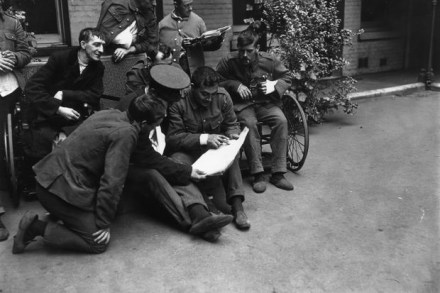Previous
‘But I thought he was from YOUR previous marriage.’

‘But I thought he was from YOUR previous marriage.’

‘I mean, for goodness sake! What is wrong with these people?’

‘Am I back in the Middle Ages or in the present day?’


‘It’ll create thousands of jobs for constitutional experts.’



‘He’s from Doctors without Borders.’
The other Tory split Sir: With regard to the article by James Forsyth (‘The great Tory split’, 6 September), there is another dimension to the future of the Conservative party of which the Scottish independence vote is symbolic. The Conservative and Unionist party looks as though it lacks the leadership and the political skills to keep
[audioplayer src=”http://traffic.libsyn.com/spectator/TheViewFrom22_11_Sept_2014_v4.mp3″ title=”Fraser Nelson, Tom Holland and Leah McLaren discuss how we can still save the Union” startat=50] Listen [/audioplayer]Birth of a nation A reminder of how England and Scotland came to be one country: — Proposals had been made throughout the 17th century, with English Whigs generally in favour and Tories less keen. —

[audioplayer src=”http://traffic.libsyn.com/spectator/TheViewFrom22_11_Sept_2014_v4.mp3″ title=”Fraser Nelson, Tom Holland and Leah McLaren discuss how we can still save the Union” startat=50] Listen [/audioplayer]Next week, the most important vote in recent British history will be held. Indeed, it may well turn out to be one of the last ballots in British history. Seven months ago, this magazine devoted its
Home England suddenly began to take the prospect of Scottish independence seriously after a poll of 1,084 people by YouGov put support for it at 51 per cent and opposition at 49 per cent. A survey by TNS showed 38 per cent of Scots backed independence compared to 39 per cent opposing it (with 23



With only seven days to go until the referendum, urgent action is needed to help save the Union. In this week’s issue, we asked Spectator readers to write to Scottish voters, saying why they are hoping for a ‘No’ vote. The response was extraordinary. You can read some of the letters here. Fraser Nelson is

‘An apology’, From The Spectator, 12 September 1914: WE are informed that a story told in a letter from a correspondent signing herself “A Country District Visitor,” and published on August 22nd, 1914, has had an injurious effect upon Mr. C. H. Schuhmacher, Chemist, of Heswall, Cheshire. In contradiction of the statements quoted in that
‘An apology’, from The Spectator, 12 September 1914: We are informed that a story told in a letter from a correspondent signing herself ‘A Country District Visitor’, and published on August 22nd, 1914, has had an injurious effect upon Mr C.H. Schuhmacher, Chemist, of Heswall, Cheshire. In contradiction of the statements quoted in that letter, we

[audioplayer src=”http://traffic.libsyn.com/spectator/TheViewFrom22_11_Sept_2014_v4.mp3″ title=”Fraser Nelson, Tom Holland and Leah McLaren discuss how we can still save the Union” startat=50] Listen [/audioplayer]At 9.30 p.m. last Saturday news broke that Scotland’s ‘yes’ campaign had established its first opinion poll lead. Since then, the country has been confronting the possibility of its impending dissolution. The vote will affect all
The papers of Monday published the welcome news that Britain, France, and Russia have agreed ‘not to conclude peace separately during the present war.’ Of course, it was quite unthinkable that Britain, France, or Russia should be so base as to make terms at the expense of her friends. Nevertheless, a signed pledge is an excellent

From The Spectator, 12 September 1914: WE are not going to begin shouting before we are out of the wood. We say this out of no foolish superstition that it is unlucky to do so, but for the very plain and good reason that we are not out of the wood, though we admit that

From The Spectator, 12 September 1914: We were unable to find space last week in which to chronicle the election of the new Pope—Cardinal della Chiesa. Let us trust that, though he takes possession of the Holy See at a period of such stress and storm, the major part of his pontificate may be peaceful

‘The Magazines’, from The Spectator, 5 September 1914: THE most interesting paper in the new Nineteenth Century is that by Sir Harry Johnston on “The German War and its Consequences.” Writing as one with many German friends, he sets forth the reasons why his love for Germany has changed to righteous anger. They are, briefly,
